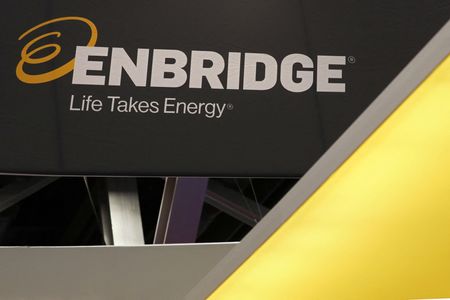By Mrinalika Roy
(Reuters) -Enbridge shares tumbled nearly 7% to an over four-year low on Wednesday, as investors fretted over the Canadian pipeline operator’s debt load from the surprise $14 billion bid for three natural gas distribution companies from Dominion Energy.
The move to acquire East Ohio Gas, Questar Gas, and Public Service Co of North Carolina would double Enbridge’s gas distribution business and make it the largest gas utility by volume in North America, with the unit accounting for a bit less than a fourth of the company’s overall business mix.
The deal announced on Tuesday is seen as a bet on the future of natural gas in a regulated market even as energy companies and consumers transition to a greener future by phasing out fossil fuels.
Analysts, however, were surprised at the timing, the scale and impact such a deal would have on the company’s already leveraged balance sheet.
“This is more high cost issuance, to me it’s like somebody in a hole trying to get out of it by digging deeper,” said Ryan Bushell, president of Newhaven Asset Management, which holds shares in Enbridge.
“I don’t see how you can keep piling more issuance – debt and equity – on this company at these rates. The market is clearly telling them they don’t have a strong currency to do so.”
‘OFF GUARD’
Enbridge announced the deal just over a month after CEO Greg Ebel told analysts the company saw “tuck-in” acquisition opportunities “across the board.”
“I do think the market was caught a bit off guard, as this wasn’t on my bingo card,” Morningstar analyst Stephen Ellis said. “Management had a realistic approach towards allocating capital, so a smaller transaction (perhaps a deeper investment in Canadian LNG?) would have been more expected,” Ellis said.
Credit rating agencies S&P Global Ratings and Moody’s cut their outlook on Enbridge following the announcement.
S&P estimates Enbridge’s debt to EBITDA ratio – a measure of company’s ability to repay debt – to rise to about 4.9, which leaves limited cushion for Enbridge to execute its funding plan “without relying on more than our assumed proportion of debt.”
At the end of 2022, the ratio was at 4.7, and Enbridge’s guidance is to keep it in a 4.5 to 5.0 range.
Enbridge is raising about C$4 billion by selling new shares at a discount of 7.2% to its Tuesday close to part-fund the transaction, while rest of the funding would come from debt, sale of non-core assets and others.
In a note, analyst Ellis called the acquisition a “defensive move” and said despite the size of the deal, Enbridge left its 5% annual EBITDA growth expectation over the medium term unchanged, which suggests that the earnings contribution is “replacing weaker results on the liquids side of the business.”
Enbridge shares provisionally closed down 5.9% at C$45.31, while the benchmark Canadian share index was off 0.9%. Rival TC Energy dropped 2.2%.
“While Enbridge paid a reasonable price, high leverage and funding gap could act as overhang,” Wells Fargo analysts said in a note.
Separately, pipeline operator Williams Companies CEO Alan Armstrong said at the Barclays CEO Energy-Power Conference in New York that the company was not interested in the three utilities Enbridge has offered to buy as the return rate would be too low.
(Reporting by Mrinalika Roy in Bengaluru; Additional reporting by Nia WilliamsWriting by Denny ThomasEditing by Anil D’Silva, Alexandra Hudson, Devika Syamnath and Marguerita Choy)

